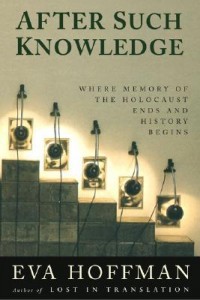Yom HaShoah Reflections on Eva Hoffman’s AFTER SUCH KNOWLEDGE (A Guest Post by Ellen Cassedy)
As we approach Yom HaShoah (Holocaust Remembrance Day), author Ellen Cassedy shares reflections on an influential book in this guest post.
Remembering the Holocaust with Eva Hoffman
by Ellen Cassedy
 “What meanings does the Holocaust hold for us today – and how are we going to pass on those meanings to subsequent generations?” These are the questions Eva Hoffman poses in her courageous book, After Such Knowledge: Memory, History, and the Legacy of the Holocaust.
“What meanings does the Holocaust hold for us today – and how are we going to pass on those meanings to subsequent generations?” These are the questions Eva Hoffman poses in her courageous book, After Such Knowledge: Memory, History, and the Legacy of the Holocaust.
Hoffman’s acclaimed memoir, Lost in Translation, recounts her emigration from Poland at age 13 with her parents, who were Holocaust survivors, and her struggles to adjust to her new home in Canada. Published 15 years later, in 2004, After Such Knowledge is less well-known, but it made a deep impression on me when I first read it. As we observe Yom HaShoah, Holocaust Remembrance Day, I’ve been rereading it and finding it as provocative and valuable as ever.
The book is a multi-faceted meditation. It draws on Hoffman’s personal experiences and those of other children of survivors; her extensive reading in the fields of psychology, culture, and politics; and her years of conversations with Poles and Germans of all ages.
I discovered the book at the exact moment that I myself was embarking on a journey to the Old World – to Lithuania, the land of my Jewish forebears. (more…)
